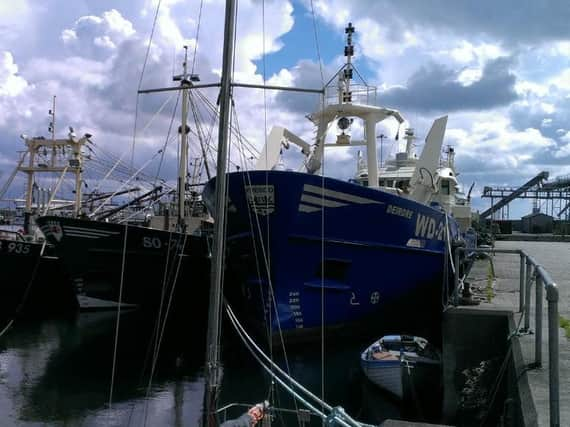'Appalling' that Irish fishermen are being prevented from landing catch at Greencastle and other ports, blasts Pádraig Mac Lochlainn


Deputy MacLochlainn said it is unacceptable Killybegs and Castletownbere are the only ports in the 26 counties designated for so-called 'third country landings.'
He urged the Taoiseach Micheál Martin to remedy the situation immediately.
Advertisement
Hide AdAdvertisement
Hide Ad"The Taoiseach will recall that in 2019, the Sea-Fisheries (Amendment) Act came through the Houses and at that time, the Government stated that its purpose was to reinstate the principle of voisinage to allow Irish fishers, no matter where they were resident on the island of Ireland, to fish and sell their produce on this island," said the Buncrana-based T.D.
He was referring to the voisinage [neighbourhood] arrangement that existed between Dublin and Belfast from the mid-1960s and allowed Irish vessels from both the North and the South to access each other’s ‘territorial waters’.
Speaking in the Dáil this week Deputy Mac Lochlainn blasted: "Irish fishermen with a licence in the North of Ireland are being prevented from landing their fish in harbours and piers across the State, with the exception of Killybegs and Castletownbere.
Advertisement
Hide AdAdvertisement
Hide Ad"In counties such as Donegal, this means that the Sea-Fisheries Protection Authority is literally at harbours preventing Irish fishermen from landing into those harbours. Worse than that, it is going to co-operatives and producers and getting rid of their lobsters and crabs.
"It is an appalling situation. The Taoiseach has it in his power to designate more piers and harbours across the State by this Friday and to reinstate the fishing rights of these fishers and their right to supply to this island."
The Taoiseach acknowledged the concerns of local fishermen.
"The Deputy raises a serious and important issue because from January 1, the United Kingdom has become a third country and therefore, it is subject to illegal, unregulated and unreported fishing legislation under the North East Atlantic Fisheries Commission requirements.
Advertisement
Hide AdAdvertisement
Hide Ad"Castletownbere and Killybegs are the Irish ports designated for third country landings of fish for those purposes. That includes Northern Ireland UK vessels. As we know and as the Deputy has said, UK fishing vessels, including Northern Ireland vessels, have had a pattern of landing at many Irish ports prior to the UK leaving the European Union.
"The Minister for Agriculture, Food and the Marine has requested the Sea-Fisheries Protection Authority to review the issue in terms of additional resources that will be required in the event of further designations and work is being done on the issue. There are practical issues involved in the designation of further ports but I take the overall point that the Deputy has made."
In reference to the situation the Sea-Fisheries Protection Authority has stated: "As the UK is no longer an EU Member state, UK registered fishing vessels, including those vessels which are registered to addresses in Northern Ireland, are subject to new EU fisheries and food safety controls reflecting the UK’s status now as a Third Country.
Advertisement
Hide AdAdvertisement
Hide Ad"From January 1, 2021, UK registered vessels, including NI registered vessels must be pre-authorised by the SFPA prior to their arrival into port. If authorised, they may only land into one of the two Irish ports that are currently designated for Third Country landings: Killybegs or Castletownbere.
"There are certain exemptions for Northern Ireland registered vessels in relation to food safety requirements when landing to Irish ports, but otherwise they are treated as non-GB UK vessels.
"The SFPA is committed to fair and effective regulation and the application of EU regulations including those regarding third countries, such as the UK. Breaches of EU legislation can result in criminal prosecution regardless of a non-EU vessel’s country of registration.
"The SFPA would encourage all vessels owners to familiarise themselves with the new regulations. Full details are available on the SFPA website. The SFPA would also encourage any Irish registered vessel owner with a query regarding sea-fisheries regulations to contact their local SFPA port office."
Comment Guidelines
National World encourages reader discussion on our stories. User feedback, insights and back-and-forth exchanges add a rich layer of context to reporting. Please review our Community Guidelines before commenting.